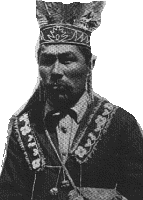Tales from Temagami - Land of Deep Water
Family Hunting Territories of Timagami BandPart of the speech delivered by second Chief Aleck Paul to anthropologist Dr. Frank G. Speck in 1913
In the early times the Indians owned this Land, where they lived, bounded by the lakes, rivers and hills, or determined by a certain number of days' journey in this direction or that. Those tracts formed the hunting grounds owned and used by the different families.Wherever they went the Indians took care of the game animals, especially the beaver, just as the Government takes care of the land today. So these families of hunters would never think of damaging the abundance or the source of supply of the game, because that had come to them from their fathers and grandfathers and those behind them. It is, on the other hand, the white man who needs to be watched. He makes the forest fires, he goes through the woods and kills everything he can findm whether he needs its flesh or not, and then when all the animals in one section are killed he takes the train and goes to anohter where he can do the same. We Indian families used to hunt in a certain section for beaver. We would only kill the small beaver and leave the old ones to keep breeding. Then when they got too old, they too would be killed, just as a farmer kills his pigs, preserving the stock for his supply of young. The beaver was the Indians's pork; the moose, his beef; the partridge, his chicken; and there was the caribou or red deer, that was his sheep. All these formed the stockon his family hunting ground, which would be parceled out among the sons when the owner died. He said to his sons, "You take this part; take care of this tract; see that it always produces enough." That was what my grandfather told us. His land was divided among two sons , my father and Pishabo (Tea Water), my uncle. We were to own this land so no other Indians could hunt on it. Other Indians could go there and travel through it, but could not go there to kill the beaver. Each family had its own distict where it belonged, and owned the game. That was each one's stock for food and clothes. If another Indian hunted on our territory we, the owners, could shoot him. This division of the land started in the beginning of time, and always remain unchanged.
I remember about twenty years ago some Nippising Indians came north to hunt on my father's land. He told them not to hunt beaver. "This is our land," he told them; "you can fish but must not touch the fur, as that is all we have to live on." Sometimes an owner would give permission for strangers to hunt for a certain time in a certain tract. This was often done for friends or when neighbours had had a poor season. Later the favor might be returned.
|

